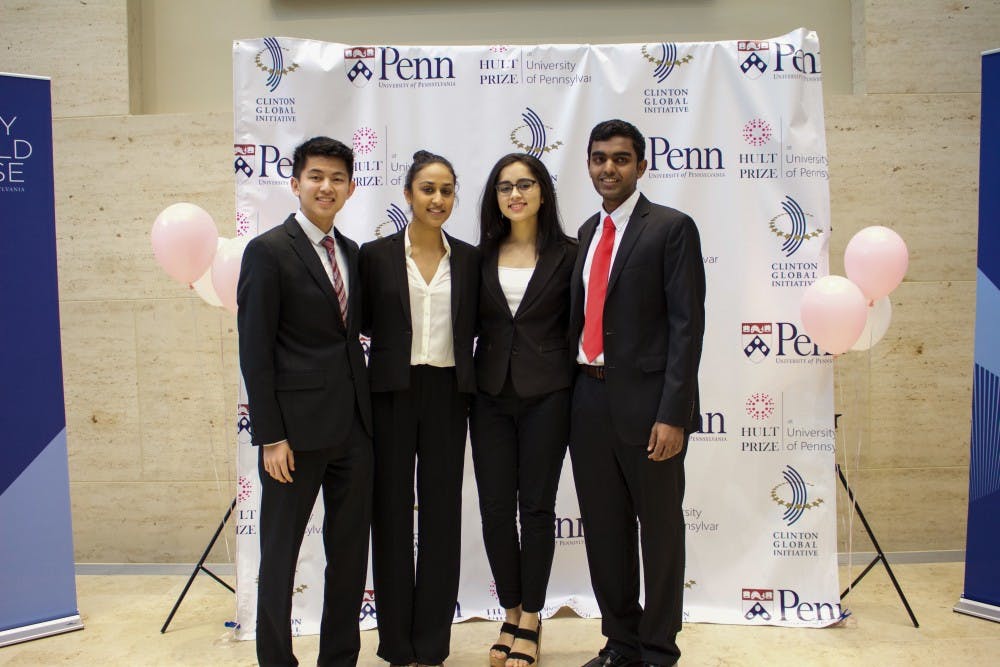
The winning team, Team Haya, includes Engineering and Wharton freshman Nishita Jain, Wharton freshman Riddhi Surana, College and Wharton freshman Varun Vallabhaneni and Wharton freshman Charles Zhang.
Credit: Zihan Xiong , 192032015296The room suddenly went silent. Everyone froze in anticipation of the words that would come next.
“Team Haya!”
A cry of disbelief, hugs and beaming smiles followed. Four Penn freshmen had just won the Hult Prize at Penn, securing their place to compete for $1 million in seed funding at the regional competition in March.
The Hult Prize at Penn final competition took place Saturday at the Perry World House. Twelve teams of three to four Penn students addressed this year’s challenge — the refugee crisis — by formulating ideas for startups and pitching them to judges. The winning idea was a toothbrush designed using plant-based material that requires neither toothpaste nor water. The event was part of an international competition run by the Hult Prize Foundation, attracting 20,000 students from over 100 countries.
While the United Nations estimates that there are 60 million global refugees, the Hult Prize Foundation believes there are one billion.
“Millions [of refugees] have been separated from their families ... lost their old lives and endured a significant amount of emotional suffering,” said College junior and Hult Prize at Penn Campus Director Tiffany Yau, a former Daily Pennsylvanian reporter. “[Earlier this month] we had a speaker come in who was a [Syrian] refugee [living in] Philadelphia, and just listening to his story, it was incredibly moving...”
Team Haya includes Engineering and Wharton freshman Nishita Jain, Wharton freshman Riddhi Surana, College and Wharton freshman Varun Vallabhaneni and Wharton freshman Charles Zhang.
The Hult Prize requires each team to propose a business model, something Jain finds essential to sustainable solutions.
“It’s really hard to scale a nonprofit because [they] are so dependent on donations ... and outside sources for funding,” Jain said. “It allows you to be self-sustaining in a way that will ... maximize your social impact.”
Margaret O’Sullivan, who served as one of the three judges, could connect the pitches she heard to her own experiences as the Executive Director of the Nationalities Service Center.
“Since I run an agency that receives refugees that come to the United States from all parts of the world, we see the outcome of what happens when they are deprived of things such as dental care, family care, mental healthcare,” O’Sullivan said. “In composite, teams that presented covered almost every area.”
O’Sullivan said she was particularly impressed with the teams’ ability to incorporate technology into their social enterprises.
“This generation is so focused and so good at forging through with technology and moving the needle with technology,” O’Sullivan said. “I was inspired by the potential to see these two areas come together, using their technological acumen more and more in the sectors that help humanity, because we need it.”
The Daily Pennsylvanian is an independent, student-run newspaper. Please consider making a donation to support the coverage that shapes the University. Your generosity ensures a future of strong journalism at Penn.
Donate




